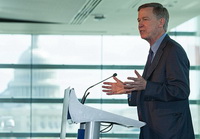Fall 2018 Roundtable Meeting
Policymakers, Roundtable Members Focus on Economy, Elections, And Monetary Policy
This week’s Real Estate Roundtable Fall Meeting featured discussions with U.S. policymakers regarding national public policies affecting the commercial real estate industry, job creation and the economy.
- Roundtable Chair Debra A. Cafaro (Chairman & CEO, Ventas, Inc.) opened the meeting stating: "The 'results-oriented' focus of The Roundtable continues to emphasize our optimism about the economy and the positive contributions the real estate industry provides as a job creator and a cornerstone for retirement savings." She added, "we must continue to proactively advance policies that promote a healthy balance of capital and people flows to create sustainable economic growth that is good for our industry and our national economy."
Meeting speakers included:
- Colorado Governor John Hickenlooper (D-CO) called for private-public collaboration to address a range of national policy challenges affecting urban, suburban and rural areas, including workforce housing and infrastructure.
- Sen. Tim Kaine (D-VA) discussed incentivizing the private sector to achieve pro-growth economic policy.
 |
Colorado Governor John Hickenlooper (D-CO) called for private-public collaboration to address a range of national policy challenges affecting urban, suburban and rural areas, including workforce housing and infrastructure. |
- Craig S. Phillips — counselor to U.S. Department of Treasury Secretary Steven Mnuchin — addressed issues such as GSE reform; reauthorization of the Terrorism Risk Insurance Program Reauthorization Act of 2015 (TRIPRA) beyond its scheduled expiration date at the end of 2020; the ongoing implementation of recent tax law changes; and the new federal "Opportunity Zones" investment program. (Roundtable Comment Letter, June 28)
- Sen. David Perdue (R-GA) — member of the Senate Banking, Housing and Urban Affairs Committee and the only former Fortune 500 CEO in Congress — emphasized the need for bipartisanship in Congress to address an ongoing budget deficit crisis and eliminate regulatory redundancy.
- Kevin Warsh — former Governor, Federal Reserve (2006-2011) — discussed the strength of the current economy and future potential economic risks. Mr. Warsh's op-ed in the Wall Street Journal this week addresses the Fed's nearly $3 trillion balance sheet and maintaining a "neutral real interest rate."
- Bob Woodward — Pulitzer Prize-winning Journalist & Author, The Washington Post — spoke about his latest book, Fear: Trump in the White House and the mid-term elections.
The Roundtable's State of the Industry Meeting and it's policy advisory committees will meet January 29-30, 2019 in Washington, DC.
Policy Landscape
House Passes “Tax Reform 2.0” Legislation; President Trump Signs Government Funding Bill
he House today passed “Tax Reform 2.0” legislation (H.R. 6760) that would make permanent the 2017 tax cuts for individuals and certain pass-through businesses – currently set to expire at the end of 2025.
 |
The House today passed “Tax Reform 2.0” legislation (H.R. 6760) that would make permanent the 2017 tax cuts for individuals and certain pass-through businesses – currently set to expire at the end of 2025. |
- As GOP policymakers seek to highlight last year's Tax Cuts and Jobs Act (P.L. 115-97) as their signature achievement before the November mid-term elections, today's bill passed on a mostly partisan vote of 220-191. Among the provisions in H.R. 6760:
- Individual marginal rates of 10%, 12%, 22%, 24%, 32%, 35%, and 37%;
- Capping the deduction for state and local taxes (SALT) at $10,000; and
- a 20% tax deduction for the business income of certain pass-through businesses.
- "By making the new code permanent for families and small businesses, the Protecting Family and Small Business Tax Cuts Act will keep America’s economy booming," House Ways and Means Committee Chairman Kevin Brady (R-TX) said on the House floor.
- The House on Thursday passed two other tax bills (H.R. 6756 and H.R. 6757) that would expand incentives for retirement savings and startup businesses. All three bills now go to the Senate, where chances to pass H.R. 6760 are unlikely without support from Democrats.
- Also today, President Trump signed a spending bill that funds most government programs through Sept. 30, 2019 while extending others via a “Continuing Resolution” until Dec. 7. Funding for those programs was scheduled to expire on Sunday at midnight. (White House Statement, Sept. 28)
- Among the programs extended for another year is the EB-5 immigration investment program – the 14th extension since Sept. 2015.
As the confirmation process for President Donald Trump’s Supreme Court nominee Brett Kavanaugh dominated the Senate this week, the House adjourned today until after the midterm elections. (Politico, Sept. 28).


